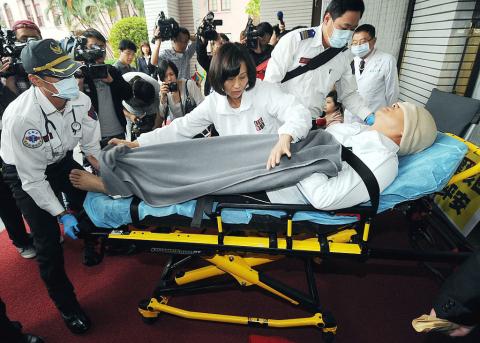Chinese Nationalist Party (KMT) Legislator Lin Yu-fang (林郁方) said that the Fourth Nuclear Power Plant in New Taipei City’s Gongliao District (貢寮) “would be refrigerated permanently without any need for a referendum” for as long as electricity was in good supply.
The KMT’s resolution on the facility was reached in a party meeting on Thursday night, with the “refrigeration” decision — which means the plant is left without fuel rods inserted and thus unactivated — called by many a “concession” by President Ma Ying-jeou’s (馬英九) administration.
The resolution was based on Lin’s proposal who yesterday morning said the facility should be “sealed up” and its future use left open, “so that if one day there is a shortage of electricity, the plant’s activation would still be a viable option.”

Photo: Fang Pin-chao, Taipei Times
“If there is no such shortage, as anti-nuclear activists claim, then they don’t have to worry about a possible referendum or an activation,” he said, adding that the facility should not be scrapped “because you’re not God or a prophet, so you cannot foresee whether there will be plenty of electricity in the future.”
When asked about Taiwan Power Co’s (Taipower) contribution to a report in the Chinese-language United Daily News about the costs involved in sealing the plant and a subsequent activation, Lin said that Taipower “is in no position to have a say in this discussion.”
“They have changed their statements too often for the public to trust them,” Lin said.
The state-owned entity did not actually give precise figures in the report.
He also commented on the existing referendum threshold stipulated under the Referendum Act (公民投票法).
“I have to agree with the Democratic Progressive Party [DPP] about the threshold being too high,” Lin said, adding that referendums could be differentiated into two kinds: one type pertaining to national identity and security, which would require a higher threshold, and another to people’s livelihood.
Meanwhile, KMT party caucus whip Lin Hung-chih (林鴻池) said he was not so sure about Lin Yu-fang’s “no shortage, no referendum” dictum.
In a press conference yesterday, Lin Hung-chih, when asked about the schedule for a potential referendum, said that the referendum is to take place after the plant’s completion and a safety check, with dates unspecified, according to the KMT’s resolution.
Saying the aim of the resolution is to “allow the public to have enough time to deliberate and to think it through,” Lin Hung-chih did not make affirmative response on Lin Yu-fang’s promise of “sealing-up” the plant.
Meanwhile, DPP Legislator Chen Ou-po (陳歐珀), who accompanied former DPP chairman Lin I-hsiung (林義雄) on his hunger strike and mute protest on Tuesday, passed out yesterday morning due to low blood sugar levels and high blood pressure.
Chen had been expected to speak at the national-affairs forum on the legislative floor, where lawmakers were to voice their concerns over government policies.
Instead of speaking, he held up for the whole three-minute session assigned for each registered lawmaker a banner that read: “Stop the Fourth Nuclear Power Plant’s construction to ensure [our] safety.”
The lawmaker then reportedly collapsed suddenly when he returned to his sit-in position outside the chamber and was immediately taken to National Taiwan University Hospital.

Several Chinese Nationalist Party (KMT) officials including Chairman Eric Chu (朱立倫) are to be summoned for questioning and then transferred to prosecutors for holding an illegal assembly in Taipei last night, the Taipei Police said today. Chu and two others hosted an illegal assembly and are to be requested to explain their actions, the Taipei City Police Department's Zhongzheng (中正) First Precinct said, referring to a protest held after Huang Lu Chin-ju (黃呂錦茹), KMT Taipei's chapter director, and several other KMT staffers were questioned for alleged signature forgery in recall petitions against Democratic Progressive Party (DPP) legislators. Taipei prosecutors had filed

Taiwan would welcome the return of Honduras as a diplomatic ally if its next president decides to make such a move, Minister of Foreign Affairs Lin Chia-lung (林佳龍) said yesterday. “Of course, we would welcome Honduras if they want to restore diplomatic ties with Taiwan after their elections,” Lin said at a meeting of the legislature’s Foreign Affairs and National Defense Committee, when asked to comment on statements made by two of the three Honduran presidential candidates during the presidential campaign in the Central American country. Taiwan is paying close attention to the region as a whole in the wake of a

NEW WORLD: Taiwan is pursuing innovative approaches to international relations through economics, trade and values-based diplomacy, the foreign minister said Taiwan would implement a “three-chain strategy” that promotes democratic values in response to US tariffs, Minister of Foreign Affairs Lin Chia-lung (林佳龍) said. Taiwan would aim to create a “global democratic value chain,” seek to capitalize on its position within the first island chain and promote a “non-red supply chain,” Lin was quoted as saying in the ministry’s written report to the Legislative Yuan submitted ahead of the legislature’s Foreign Affairs and National Defense Committee meeting slated for today. The Ministry would also uphold a spirit of mutual beneficial collaboration, maintaining close communication and consultations with Washington to show that Taiwan-US cooperation

Taiwan and the US have begun trade negotiations over tariffs imposed by US President Donald Trump earlier this month, Minister of Foreign Affairs Lin Chia-lung (林佳龍) said in an interview this morning before reporting to the Legislative Yuan’s Foreign Affairs and National Defense Committee. The Taipei Economic and Cultural Representative Office (TECRO), Taiwan’s de facto embassy in the US, has already established communication channels with the US Department of State and the US Trade Representative (USTR), and is engaging in intensive consultations, he said. Points of negotiation include tariffs, non-tariff trade barriers and issues related to investment, procurement and export controls, he